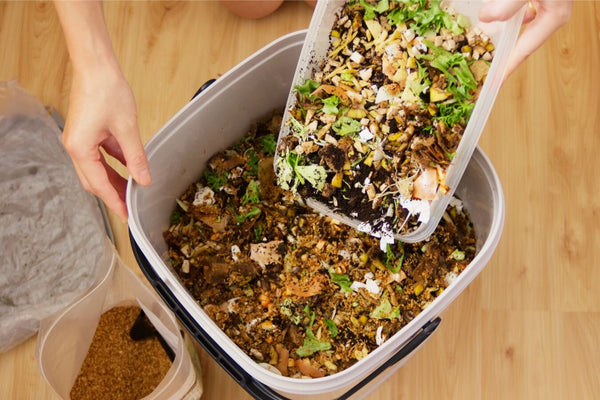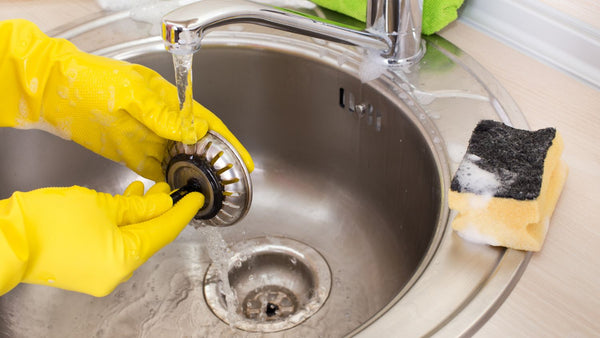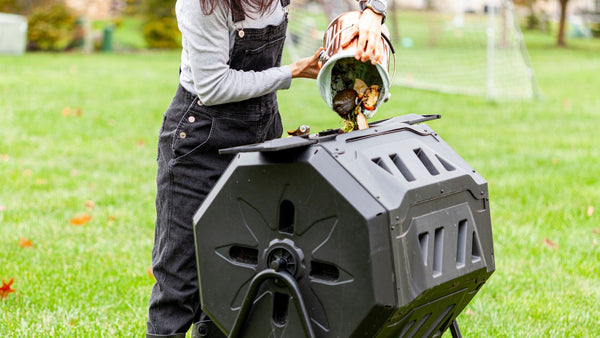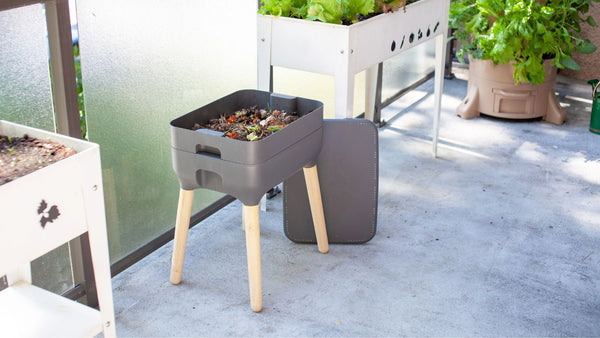While garbage disposals seem like a convenient solution, they come with their fair share of issues. From clogged pipes to foul odors, there's a lot to consider. Luckily, there are several efficient and eco-friendly alternatives to choose from. In this guide, we'll walk you through the top options and help you make an informed decision. Whether you're looking for simplicity, convenience, or sustainability, there's an alternative for every kitchen.
6 Common Issues With Garbage Disposals
Before diving into the alternatives, let's explore why you might want to consider a switch. Here are seven compelling reasons to explore other waste disposal methods:
|
Issues
|
Why Consider an Alternative
|
|
Large List of Restricted Food Items
|
Many food items, like vegetable peels and rice or pasta, can wreak havoc on garbage disposals, especially those with septic systems.
|
|
Prone to Clogs
|
Garbage disposals are notorious for getting jammed and blocked, leading to frustrating maintenance or costly professional repairs.
|
|
Intimidating to Reach Into
|
The thought of the sharp grinder accidentally getting turned on while you're reaching to retrieve a spoon or other item is unpleasant and scary.
|
|
Noisy Operation
|
These units can be quite noisy, especially when jammed, making them less than ideal for households with light sleepers or shared living spaces.
|
|
Water Waste
|
Garbage disposals use 2-5 gallons of water each time you use it to flush food scraps.
|
|
Strain on Water Facilities
|
Using garbage disposals means channeling extra waste to water treatment plants and septic systems, which can cause processing challenges.
|
7 Efficient Garbage Disposal Alternatives
Although each of these items are good alternatives, Sepura is the only direct garbage disposal alternative. Sepura offers you all the benefits of easy food disposal without any risk of food entering and clogging your plumbing.
Here are six practical alternatives to traditional garbage disposals, each tailored to different preferences and lifestyles.
- Sepura - The Composting Garbage Disposal
- Bokashi Bin
- Sink Strainer
- Outdoor Composting
- Compost Tumbler
- Vermicomposting
- Green Cone Digester
Each of these six alternatives to sink disposals offers its unique advantages and compromises, yet all options are more environmentally friendly.
1. Sepura - The Composting Garbage Disposal

Sepura is a cutting-edge garbage disposal alternative that revolutionizes food waste management.
Unlike traditional disposals, Sepura collects food scraps in an odor-free compost bin, keeping solids out of your plumbing system. It's septic-friendly and makes composting effortless, making it an efficient and sustainable choice for modern kitchens, or homes with older pipes.
|
Pros
|
Cons
|
|
Food washed down your sink is sent to a compost bin instead of into your pipes
|
Initial investment cost
|
|
Septic-friendly
|
In high demand and can sell out quickly |
|
Only liquids enter your pipes
|
|
|
Odor-proof design with air intakes and a carbon filter
|
|
Recommended for: Those seeking an advanced, septic-friendly garbage disposal alternative that protects your plumbing, simplifies kitchen cleanup, and makes composting convenient.
Shop Sepura Today2. Bokashi Bin

The Bokashi bin is a specialized indoor composting system. It utilizes an anaerobic (without oxygen) fermentation process to break down organic waste, including food scraps.
Bokashi bins are known for their ability to process a wide range of food waste, including meat and dairy products.
|
Pros
|
Cons
|
|
Can create compost
|
Size of trash bin and recycling bins, not countertop friendly
|
|
Emanates little to no odor
|
Not ideal for large amounts of food waste
|
|
Microbial additive helps speed up the process
|
Recommended for: Those looking for an indoor composting solution that's space-efficient and minimizes odors.
3. Sink Strainer

A sink strainer is a simple, yet effective, device designed to catch food scraps before they enter the drain.
It's a cost-effective solution that helps prevent solid waste from entering your pipes. Sink strainers are easy to install, but do require frequent emptying.
|
Pros
|
Cons
|
|
Inexpensive
|
Can only hold small amounts of food before it needs to be emptied
|
|
Straightforward
|
Catches food but doesn’t remove it from your home
|
|
You have to continuously handle and empty the wet food waste into a compost bin
|
Recommended for: Individuals don’t mind continuously emptying and touching wet food waste and seek a straightforward, budget-friendly solution to prevent food scraps from clogging the drain.
4. Outdoor Composting

Outdoor composting involves creating a designated area in your yard to decompose organic waste. This method is cost-effective and environmentally friendly.
By combining yard waste with kitchen scraps, you can produce nutrient-rich compost that enriches soil and benefits plants. However, this approach requires outdoor space and periodic turning of the compost pile.
|
Pros
|
Cons
|
|
Inexpensive
|
Not accessible for those in apartments or without yard space
|
|
Ideal for large amounts of food waste
|
Requires minor physical labor
|
Recommended for: Individuals with outdoor space and an interest in creating nutrient-rich compost for gardening.
5. Compost Tumbler

A compost tumbler is a container designed for composting organic waste. It typically consists of a drum or bin mounted on a frame, which can be rotated to aerate the composting materials. This design accelerates the decomposition process, resulting in nutrient-rich compost that can be used in gardens.
|
Pros
|
Cons
|
|
Reduces food waste volume significantly
|
Initial investment cost
|
|
Produces nutrient-rich soil amendments
|
May require electricity to operate
|
Recommended for: Those with outdoor space and an interest in efficiently composting kitchen and yard waste. Ideal for individuals seeking nutrient-rich compost for gardening.
6. Vermicomposting

Vermicomposting utilizes specialized composting worms, typically red wigglers, to break down organic waste.
These worms accelerate the decomposition process, turning food scraps into nutrient-rich vermicompost. Vermicomposting can be done indoors or outdoors, and it's an excellent choice for those who want to enhance soil fertility while reducing waste.
|
Pros
|
Cons
|
|
Enhances soil nutrition and fertility
|
Not suited for the squeamish
|
|
Creates healthy fertilizer quickly
|
Somewhat more expensive setup
|
|
Can be done indoors or outdoors
|
May produce a mild odor
|
Recommended for: Enthusiasts willing to incorporate worms into the composting process for efficient waste breakdown.
7. Green Cone Digester

The green cone digester is an underground waste disposal system designed for food waste. It consists of a green cone-shaped basket placed in the ground, allowing natural decomposition to occur. It's septic-friendly and requires minimal maintenance.
|
Pros
|
Cons
|
|
Natural breakdown of food waste
|
Requires some digging for installation
|
|
Septic-friendly
|
May not be suitable for all soil types
|
|
Low maintenance
|
Recommended for: Individuals with outdoor space and septic systems looking for a low-maintenance waste disposal solution.
In the end, the choice of an alternative garbage disposal method comes down to your specific needs, preferences, and lifestyle. Whether you opt for the simplicity of a sink strainer, the efficiency of Sepura, or another method entirely, you're taking a step toward a more sustainable and hassle-free kitchen experience.
Why Sepura is The Ultimate Alternative to Garbage Disposals

When it comes to efficient waste disposal, Sepura stands head and shoulders above traditional garbage disposals. Let's compare the common problems associated with disposals and how Sepura provides a seamless solution.
|
Common Problems with Disposals
|
How Sepura Offers a Solution
|
|
Intimidating to reach into because of sharp grinder
|
No sharp grinder, detects non-food items and stops operating until the item is retrieved
|
|
Can't use it with a list of foods to avoid damage to disposal
|
Sepura effortlessly handles all food scraps 3mm and larger
|
|
Uses a lot of water to operate
|
Does not require water to operate
|
|
Loud and disruptive when operating
|
Quiet and maintains peace in the kitchen while operating
|
|
Sends food down your pipes which can cause clogs and damages
|
Sends food to a compost bin to reduce waste and protect your pipes (and septic)
|
|
Causes strain on water treatment facilities by sending large quantities of food bits there
|
Does not send food or cause strain to water treatment facilities
|
With Sepura, you not only bid farewell to the headaches of traditional garbage disposals but also embrace a more sustainable and hassle-free approach to kitchen waste management. Experience the future of food scrap disposal with Sepura.


